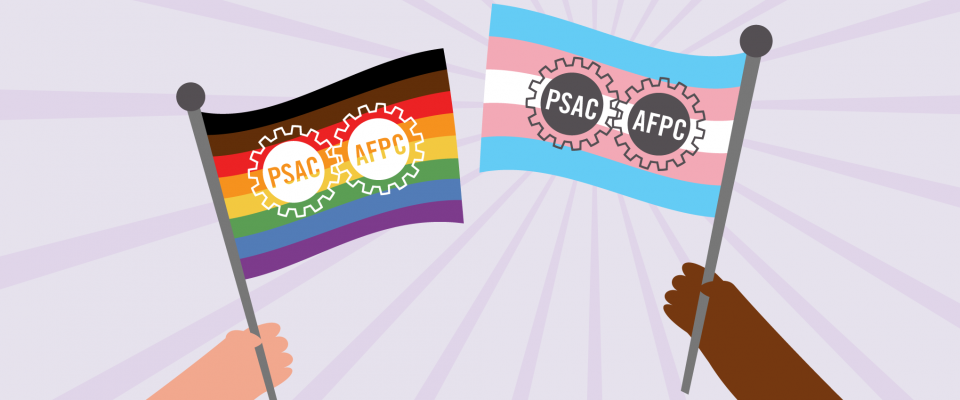Over the next few months, members and allies of the LGBTQ2+ community across the country will be celebrating Pride and recommitting to equality and justice.
Due to COVID-19, these annual celebrations won’t be highlighted by parades, marches, picnics, teach-in’s and other gatherings that usually mark Pride celebrations. While we are all saddened by the changes to Pride this year, LGBTQ2+ communities will continue to be resilient and strong. Pride organizations around the world are reimagining what Pride looks like. Several organizations will be taking to online platforms and hosting virtual Pride events. However celebrations take place this year, they will be woven with love, pride and allyship.
Reflecting on our past
Pride provides us with a moment to reflect on our past and recognize that there is much more work left to be done.
It is important to recognize that Black and racialized trans and queer women paved the way to the Pride celebrations we take part in today. Pride was born out of a political and cultural uprising, which began on June 28, 1969, during the Stonewall Riots. The riots began after two racialized trans women, Marsha Johnson and Sylvia Rivera, fought against the New York Police Department’s treatment of the LGBTQ2+ community.
Although we have made progress for LGBTQ2+ rights, the most marginalized of our communities (those who are racialized, Indigenous, Black, living with disabilities, without financial resources, trans and non-binary) remain disproportionately affected by discrimination.
Continuing the fight for justice
Pride is a time for PSAC to commit to strengthening even more our fight for justice for our LGBTQ2+ members and LGBTQ2+ communities everywhere. We pledge to:
- continue to fight to eliminate the discriminatory ban that remains on blood, organ and bone marrow donations from many LGBTQ2+ people
- fight for workplaces and government policies that are trans-inclusive
- ensure the government puts a nationwide ban on conversion therapy
- call on the federal government to collect meaningful census data on LGBTQ2+ groups, to include protections under employment equity and to ensure inclusive government policy
- fight to include HIV prevention medication and gender-affirming hormone therapies in extended health plans
- advocate for gender inclusive washrooms in workplaces
- ensure community, health and social services are affordable and accessible
Celebrate Pride
This Pride Month, we honour and stand in solidarity with our members and activists who continue to work tirelessly to help advance LGBTQ2+ rights.
PSAC encourages our members to participate in Global Pride 2020 , a live-streamed international Pride festival scheduled for Saturday, June 27.
And visit your Regional PSAC website to learn more about Pride events taking place in your region.
Take action! End conversion therapy now!
Conversion therapy is the damaging practice of denying LGBTQ2+ identity and dignity and trying to coerce people to change their identity. For decades, activists across Canada have been demanding the end to this horrific practice. This scarring and damaging process is based on a lie. It hurts children, adults and tears families apart.
At long last, the federal government announced in March 2020 the introduction of Bill C-8 to end the practice of conversion therapy in Canada.
Make sure to ask your local MP to vote in favour when this legislation comes forward soon: see the PSAC website to send a letter.
The original version of this article was first posted on the PSAC website.




